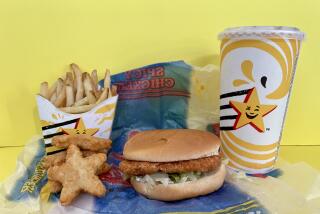CKE Fattens Itself Up as It Defies Healthy Trend
- Share via
ST. LOUIS — In the past few months, McDonald’s Corp. announced it would push healthy meals like salads while Wendy’s International Inc. said it would fry foods in oil with less trans fat.
And CKE Restaurants Inc.? The Carpinteria, Calif.-based operator of Hardee’s and Carl’s Jr. unveiled a jumbo-sized cheeseburger smothered in sliced steak.
“I think the health craze is happening mostly among journalists,” said Andrew Puzder, CKE’s chief executive.
A lean man with an athletic build, Puzder laid out CKE’s decidedly un-health-conscious business strategy during the company’s annual meeting of shareholders Tuesday in St. Louis.
The strategy is simple: Give people what they want, not what they think is good for them.
“The way people like to think they eat, and the way they actually eat is usually very different,” Puzder said.
He pointed out that CKE puts salads and low-carb burgers on its menus. “We sell very few of them,” he said.
CKE’s strategy has worked well for shareholders this year, with its stock rising 20% so far in 2006. Shares closed up 6 cents at $16.21 Tuesday.
Puzder said the growth is especially strong considering CKE’s position. The company has been revamping its chain of nearly 2,000 Hardee’s restaurants, which Puzder called dirty, poorly run and dogged by bad customer service for years.
Hardee’s turnaround has pivoted on the Thickburger, Puzder said. CKE knocked 40 items off the menu and centered its offerings around the Monster Thickburger, with its 1,420 calories and 107 grams of fat.
But the beef-at-all-costs strategy carries a risk. Puzder conceded the company’s national television ads have garnered some complaints. The ads show customers -- mostly young men -- biting into huge burgers with an amplified crunch.
McDonald’s and other companies have highlighted their healthier options in anticipation of this summer’s release of “Chew On This,” a book aimed at teenagers that is co-authored by Eric Schlosser, author of “Fast Food Nation.”
Early reports about the book say it holds fast-food companies responsible for the nation’s childhood-obesity epidemic. A movie version of “Fast Food Nation” is scheduled for release this fall.
Perhaps more alarming for shareholders is the specter of lawsuits pinning the blame for obesity on fast food chains. Such cases have been filed against McDonald’s, with most courts dismissing obesity claims. A federal court in New York reinstated part of an obesity case last year after it was dismissed twice by lower courts.
Puzder said CKE should be safe from such litigation for two reasons.
First, he said, it doesn’t hide health information about its products. Fat and calorie figures are readily available so customers can know exactly what they are eating.
Second, the company doesn’t market to kids, but focuses on young adults.
“As a former trial attorney myself -- no, I’m not worried,” he said.
Shareholder David Skroup said he’s confident in the company’s plan to boost revenue and locations worldwide.
A retired Air Force pilot who lives in Belleville, Ill., Skroup said he’s pleased with CKE’s decision to sell big burgers regardless of health-food fads.
“They know what they’re doing,” Skroup said. “It hasn’t knocked the price down and it’s increased the number of restaurants.”
More to Read
Inside the business of entertainment
The Wide Shot brings you news, analysis and insights on everything from streaming wars to production — and what it all means for the future.
You may occasionally receive promotional content from the Los Angeles Times.










